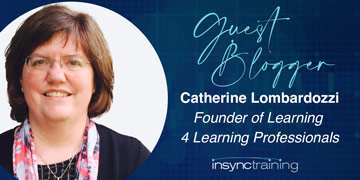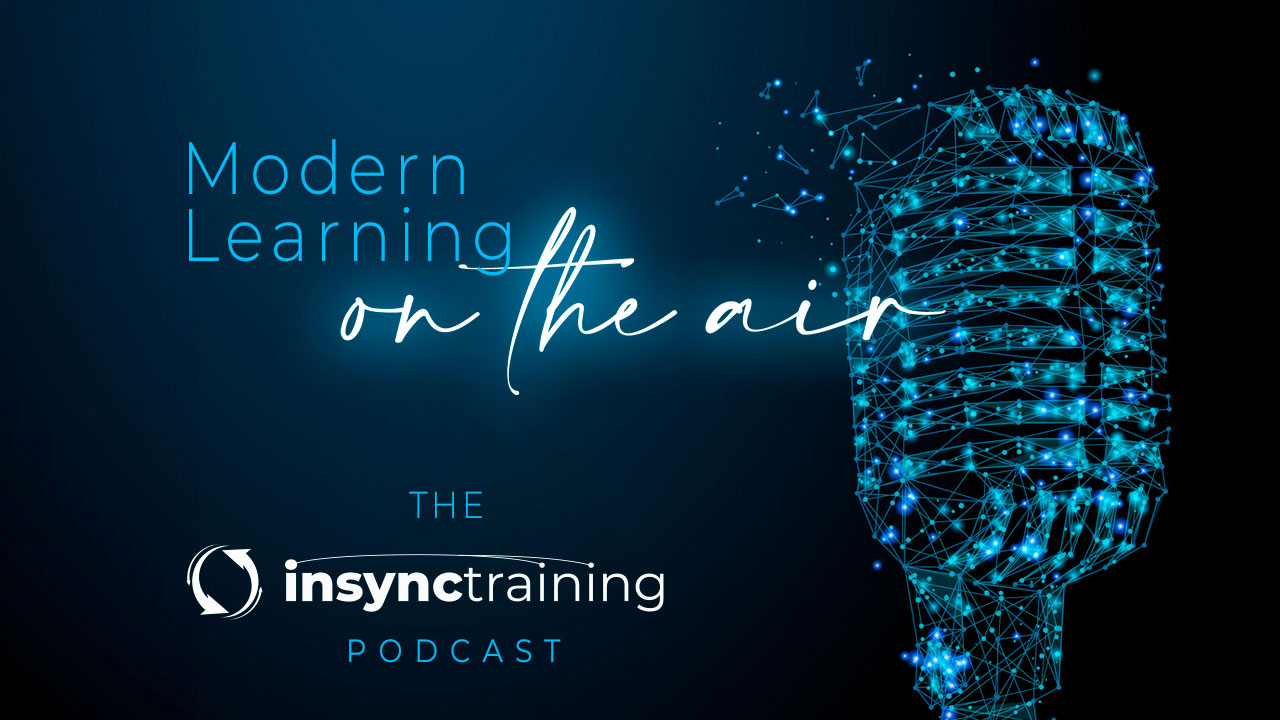Bookmarking: An Underutilized Superpower
Part of InSync Training's Thriving as a Learning Professional Series It’s hard to keep up on all that’s going on in the L&D space. Emerging...

Depending on your disposition, “lifelong learning” sounds like either an exciting opportunity or an endless drudge. In a world where lifespans are getting longer (despite a recent dip) and career paths are more meandering, learning constantly over a lifetime is one of the sure things (along with death and taxes, as the saying goes). But how we experience and facilitate lifelong learning is changing. As a learning professional, you’ll want to stay up-to-date with some of what thought leaders are saying about the future of lifelong learning.

Once upon a time, careers were defined by long-term dedication to a single organization. An individual decided on a career path, completed the required schooling, started in an entry-level position, and worked their way up the organization (as far as they wanted to go) until retirement. Over the years, this scenario morphed a bit, making allowances for shifting career paths or changing employers, but the path of learning throughout a person’s career remained fairly formulaic.
In that world, “lifelong learning” tales were crafted around formal education, continuing education courses, employer-based workshops, and occasional retraining adventures. “Lifelong learning” also became code for courses and workshops around varied interests that are offered for adults, especially retirees.
Learning in the industrial age long was envisioned as the process of developing mastery of a knowledge base and skill set from expert authorities during defined educational periods (e.g. K-12, higher education, career training, continuing studies) with structured curriculum design. Tools and techniques changed over the years, but the underlying vision for engaging in learning activities remained formal and siloed. Eventually, however, that approach became no longer viable and a new tale began to take shape.
In this emerging epoch, careers unfold quite differently. Not only do people more frequently change jobs, but also they may jump into entirely new fields. While there are still legacy organizations, more employers are start-ups, small enterprises, and entrepreneurial ventures. Further, more people are opting for working for themselves, choosing to freelance or found their own businesses.
Now, “lifelong learning” is emerging as an essential project and critical skill. Industrial age models won’t cut it in ever-changing environments with rapidly advancing technology. Some skill sets become abruptly obsolete, and newly required skills emerge seemingly out of nowhere. People need to be prepared to learn continuously over their lifetimes through a wide range of programs, resources, and tools.
To meet these needs, educational, training, and learning and development offerings need these kinds of characteristics:
Unbundled programs to allow for more targeted knowledge and skill development
Expanded focus on holistic development, including interpersonal and emotional skills (in addition to cognitive development and job skills)
Adoption of active learning strategies that allow for co-learning, expert engagement, personalized focus, and time and technique flexibility
Integration of experiences and options from many sources to form a learning ecosystem that can be tapped through varied access points
Incorporation of tools and technologies that support learning without compromising privacy and security
Availability of financial support to allow for unfettered access and individual choice
A variety of organizations have put forth new learning models that vary from building on current foundations to envisioning a complete reinvention of education and learning support systems. Some want to change the way we access education, allowing people to attend colleges and universities multiple times over the course of a lifetime in order to gain microcredentials for their next phase of life. A call for a “60-year curriculum” suggests that schooling ought to serve lifelong needs by deliberately developing more widely applicable skills such as creativity, critical thinking, problem solving, relationship development, and megacognition so that graduates have the capacity for change and self-directed learning.
Other education thought leaders advocate better systems for certifying skills that are gained through experience. Already there is a movement to eliminate the requirement for degree completion in a wide range of jobs in recognition that core knowledge and skills are developed through work history and informal means as well as through more traditional avenues.
Some activists envision more government or community investment in skill-building programs and education support to eliminate inequity of access. In other words, they want to make programs available through publicly accessed systems rather than through individual employers to give people more freedom to choose the skills they want to build and the learning programs that they’ll need to build them. These thinkers talk of learning cities and open access networks to better serve the needs of the community—businesses and individuals alike. Some also advocate public support for time out of the workforce for more intensive reskilling.
Of course, L&D strategists have been changing their views of workplace learning as well, moving toward a blended learning approach that accounts for all the ways people can learn at work—learning from formal, informal, social, experiential, personalized, and digital approaches using a full cache of tools and techniques that have emerged in this age. Critically, they recognize the importance of supporting self-directed learning.
As a result of all these developments, our systems for preparing and upskilling employees will no doubt change substantially in the coming years. No more will the tale be written by universities and training departments; it will be written by each individual making a learning journey. Indeed, the systems that support learning are not the only part that needs to change in this new era.
In alignment with the current environment, many people are adopting a new mindset about learning and development. They define their own purposes and goals and take responsibility for their own development journeys. They recognize that reinventing oneself and mastering new skills is normal. They balance the development of deep expertise (often in multiple areas) with building broad competencies. They revel in ongoing growth and don’t mind being in the learning zone rather than the comfort zone. They seek to contribute while at the same time attending to their health and well-being.
People likely will get to craft their own learning journeys over their lifetimes. Each individual tale can be filled with plot twists, exciting challenges, periods of stasis and of rapid upskilling, heroes that enable and support learning, and amazing tools to make the journey easier and more successful.
Now we get to the crux of the matter. How will an emerging conceptualization of lifelong learning impact the L&D field and our practice? What can you do to thrive in this context?
In addition to future-proofing your skills, take an expanded view of the context in which people might learn workplace skills and the scope of skills they want to develop. New kinds of providers may emerge to try to serve the needs of learners who don’t want or need (or don’t have access to) higher education and organization-based L&D. Keep attuned to what is changing about the systems for adult learning and development, and imagine how you want to fit into what is coming into play. Or, better still, become an advocate for those approaches you feel serve people and organizations well.
Most importantly, keep deepening your understanding of how people learn, as it will be the foundation of your expertise and the most valuable element you bring to the table. If you understand how to most effectively facilitate and support learning and if you have a creative mind, you’ll be able to foresee how any emerging provider, technology, or technique can be used to accelerate learning. That combination will be the magic power you bring to various diverse tales of lifelong learning and the reason everyone will want you on their team.
Want to learn more? Download InSync Training's 54-page guide: Thriving As A Learning Professional.
Modernizing learning: Building the future learning ecosystem (2019) edited by J.J. Vogel-Walcutt and Sae Schatz (See especially Chapter 4: Lifelong learning)
Seven essential elements of a lifelong-learning mindset (2019) by Jaqueline Brassey, Nick van Dam, and Katie Coates at McKinsey
The 60-year curriculum: A strategic response to a crisis (2020) by John Richards and Chris Dede in Educause Review
Embracing a culture of lifelong learning: A transdisciplinary expert consultation (2020) by the UNESCO Institute for Lifelong Learning
Oxford Handbook on Lifelong Learning (2021) edited by Manuel London. (first two chapters available for preview on Google Books)
Deliberate innovation, lifetime education (2018) by the Commission on Creating the Next in Education at Georgia Tech
Understanding adult learning in the midst of complex social “liquid modernity” (2016) by Aliki Nicolaides and Victoria J. Marsick in New Directions for Adult and Continuing Education
The emergence of long life learning (2020) by Chip Conly and Ingo Rauth for Modern Elder Academy

Part of InSync Training's Thriving as a Learning Professional Series It’s hard to keep up on all that’s going on in the L&D space. Emerging...

Transcript: A Conversation with Jennifer Hofmann and Karen Vieth Tune into the InSync Podcast where Karen Vieth, the Vice President of Virtual...